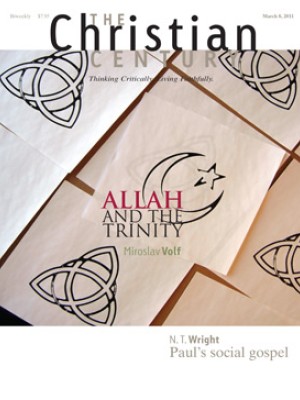Muslim Brotherhood figure disdained U.S. morality
Is the pop standard "Baby It's Cold Outside" a heartwarming ode to
winter romance or the worst example of American hedonism? After hearing
the song at a Colorado church dance in the late 1940s, Egyptian exchange
student Sayyid Qutb viewed the song as a moral indictment of the West—a
view that some say could now shape the future of Egypt.
After
returning to Egypt, Qutb emerged as the intellectual godfather of
Egypt's banned Muslim Brotherhood, a movement that appears poised to
assume a larger role in Egyptian society, possibly becoming part of
whatever government takes root after the fall of President Hosni
Mubarak.
Read our latest issue or browse back issues.
The massive demonstrations across Egypt have revived
interest—and debate—over Qutb's impact on the brotherhood and raised
the question of whether his anti-Western views, which were shaped by his
1948–1950 stay in America, will find renewed favor in the country.
Qutb
was executed in 1966 at the hands of Egyptian strongman Gamal Abdel
Nasser, but his political legacy lives on—even as scholars disagree on
whether today's modern Muslim Brotherhood and Qutb would recognize each
other.
Born in 1906, Qutb received both a Western and an Islamic
education, and in the 1930s he became a civil servant in Egypt's
education ministry. He made his name as a writer, specializing in social
and religious issues. In 1948, Qutb was sent to study the U.S.
educational system. Some scholars say Qutb already viewed America
negatively because of its ties with Great Britain, Egypt's former
colonial master, and later because of its support for Israel.
"There
was a sort of utopian quality to his vision. He thought that if society
reached a certain level of education, then this ideal Islamic society
will come into being," said Ellen Amster, an associate history professor
at the University of Wisconsin-Milwaukee.
Qutb began his U.S.
studies in Washington, D.C., at Wilson Teaching College and then moved
to Greeley, Colorado, home to Colorado State College of Education, where
he spent the bulk of his stay. It was a religiously conservative town;
consistent with Muslim beliefs, alcohol was prohibited. Still, Qutb
disdained what he saw. "Nobody goes to church as often as Americans do. .
. . Yet no one is as distant as they are from the spiritual aspect of
religion," he wrote in "The America That I Have Seen," a 20-page tract
he published in 1950.
Qutb was also critical of American sexual
mores, arguing that objectification of females and promiscuity had led
women away from their roles as mothers and resulted in the breakdown of
the family. Wrote Qutb: "The American girl is well acquainted with her
body's seductive capacity. She knows it lies in the face, and in
expressive eyes, and thirsty lips. She knows seductiveness lies in the
round breasts, the full buttocks, and in the shapely thighs, sleek
legs—and she shows all this and does not hide it."
He was also
critical of the gladiator aspect of American sports and the American
insistence on civil rather than divine laws. He finished his American
tour in Palo Alto, California, and shortly after returning to Egypt in
1950 he joined the Muslim Brotherhood.
Some observers contend that
Qutb's U.S. sojourn hardened his convictions about the West's spiritual
and moral bankruptcy—convictions that formed the basis for his more
radical views about violence, jihad and the West.
Washington Post
columnist Richard Cohen recently called Qutb a "racist, a bigot, a
misogynist, an anti-Semite and a fervent hater of most things
American"—labels all based on his time in the U.S. "The Islamic state
Qutb envisioned would be racist, anti-Semitic and anti-Christian as
well," Cohen wrote.
But others say Qutb's motivation for joining
the Brotherhood had less to do with what he saw in the United States and
more to do with his belief that Egypt's government was oppressive and
standing in the way of an Islamic state in Egypt.
Qutb never would
have approved of attacking the West, said John Calvert, a history
professor at Creighton University in Omaha, Nebraska, and author of Sayyid Qutb and the Origins of Radical Islamism.
Calvert said the modern brotherhood is politically savvy enough to know
that there's little appetite for radicalism in today's Egypt. While the
Muslim Brotherhood has a violent past, it foreswore violence in 1970.





